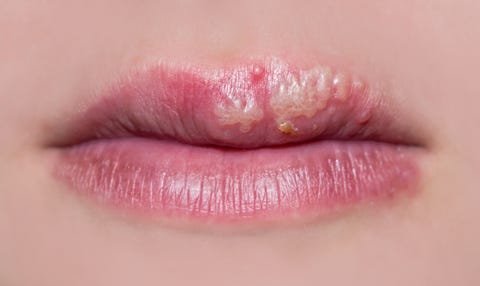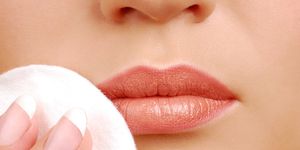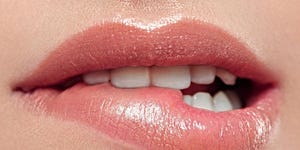

As far as red sores on or near your mouth go, zero is the number you want to have.
Alas, those little (or uh, not so little) red bumps seem to pop up whenever they damn well please and wreak havoc on your life.
But is it a cold sore (which tbh, are super common), or a canker sore that’s wrecking your lipstick game…and what’s the difference between the two anyway?
What is a cold sore?
A cold sore is an infection caused by the herpes simplex virus (HSV), and appear as fluid-filled blisters that develop on the lip or around the mouth, according to the American Academy of Dermatology (AAD).

A cold sore on the mouth is known as oral herpes (HSV-1)—and is different than genital herpes (HSV-2), according to the Centers for Disease Control and Prevention (CDC). While oral herpes can infect the genitals, it’s less likely that genital herpes can infect the mouth (a.k.a., don’t worry that genital herpes has caused your cold sore).
Here’s the thing about cold sores (and herpes sores, in general): They’re super-common—more than half of people will have HSV-1 by the time they reach their twenties, according to the U.S. National Library of Medicine (NLM).
These cold sores also typically show up in the same place every time you get one, says Mona Gohara, M.D., associate clinical professor of dermatology at the Yale School of Medicine. They also give you warning signs that one might be developing: “You can feel them before they occur,” Gohara says, as a sort of tingling sensation.
What causes cold sores?
So, herpes is extremely contagious and is often spread through skin-to-skin contact with infected areas (but it can still be spread if an infected person isn’t showing symptoms, too). That means herpes (and ultimately, cold sores) can be passed through kissing, and sharing things that go in or near your mouth (like utensils or lipstick).

Then, once you have the herpes virus, cold sores can pop up whenever—but most often they’re caused by sun, menstruation, stress, and illness, Gohara says. Basically, any time your body isn’t functioning at full capacity, throwing its immune system out of whack.
How can you get rid of cold sores?
Unfortunately, once the herpes virus is in your system, you’re stuck with it (a.k.a., it’s not curable), but you don’t have to be at the mercy of a cold sore when one does pop up—as long a you hit up your dermatologist ASAP.

“When you feel the tingling of a cold sore, you’ll probably be prescribed a pill called Valtrex,” Gohara says. Valtrex is an antiviral drug that can help the body fight back against the infection caused by the herpes virus. A dab of cortisone cream can also help reduce inflammation, Gohara says.
Cold sores do go away on their own, though, says Gohara (she suggests giving them a week to 10 days to disappear). But, while you have an open sore on your mouth, you’ll want to avoid kissing or sharing drinks with anyone, as that’s when the herpes virus is most easily transferred.
So then what are canker sores?
First things first: Canker sores aren’t STD related (TG).

Instead, canker sores (a.k.a. aphthous ulcers) are small, round sores that occur on the mucosal surfaces of your mouth (like on the inside of your cheek, under your tongue, or in the back of your throat), says Gohara—that’s different than cold sores, which occur on the outside of your mouth, like on your lips.
Canker sores typically have a red edge with a gray or white center—oh, and they’re extremely painful, per the NLM.
What causes canker sores?
Good news: Unlike cold sores, canker sores are not contagious.
Canker sores can be triggered by viral infections, as well as stress, food allergies, a lack of vitamins and minerals, and even hormonal changes,” per the NLM. Trauma to the inside of the mouth (like if you bite your inner lip) or harsh toothpastes can also bring on a canker sore, says Gohara.
Canker sores can also show up in digestive disorders, like Crohn’s disease, according to the American Academy of Oral Medicine (AAOM), as a result of immune system dysfunctions.
How can you get rid of canker sores?
In most cases, canker sores go away on their own, says Gohara—though you can try to speed the healing process along by dabbing a bit of cortisone or milk of magnesia on the affected area to coat the ulcer, she recommends. But, unfortunately, there’s no real cure for canker sores—you kind of just have to wait them out.

To keep canker sores at bay, avoid stress as best you can, stay away from highly acidic or spicy foods, and make sure your diet is rich in vitamins and nutrients, Gohara says.
If you get repeated canker sores, it might be a good idea to keep a canker sore diary, suggests the AAOM, noting what you typically eat on a daily basis, and when you get a canker sore. Doing this can help you determine if there are any foods or lifestyle changes that might help you kick canker sores for good.
You can also try a canker sore toothpaste—basically a toothpaste without sodium lauryl sulfate (SLS—a harsh detergent found in many typical toothpastes), per the AAOM—to see if that’s a culprit.
The bottom line: Yes, canker sores and cold sores are often confused, but the two are very different: Canker sores are not contagious, but cold sores are; and canker sores show up on the inside of the mouth, while cold sores are often seen on the lips.
Source: Read Full Article